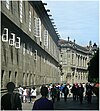Conferences
WATOC organizes a triennial world congress with over 1,000 participants in last years. [1] [4]
| # | Name | Date | Year | City | Country | Organizer | |
|---|---|---|---|---|---|---|---|
| 1 | WATOC-1987 | August 12–18 | 1987 |  | Budapest | Hungary | Imre Csizmadia |
| 2 | WATOC-1990 | July 8–14 | 1990 |  | Toronto | Canada | Imre Csizmadia |
| 3 | WATOC-1993 | July 18–25 | 1993 |  | Toyohashi | Japan | Keiji Morokuma |
| 4 | WATOC-1996 | July 7–12 | 1996 |  | Jerusalem | Israel | Amiram Goldblum |
| 5 | WATOC-1999 | August 1–6 | 1999 | | London | UK | Mike Robb Henry Rzepa |
| 6 | WATOC-2002 | August 6–9 | 2002 |  | Lugano | Switzerland | Hans-Peter Lüthi |
| 7 | WATOC-2005 | January 16–21 | 2005 | | Cape Town | South Africa | Kevin Naidoo |
| 8 | WATOC-2008 | September 14–19 | 2008 | | Sydney | Australia | Leo Radom |
| 9 | WATOC-2011 | July 17–22 | 2011 |  | Santiago de Compostela | Spain | Manuel Yáñez Otilia Mó |
| 10 | WATOC-2014 | October 5–10 | 2014 |  | Santiago de Chile | Chile | Alejandro Toro-Labbé |
| 11 | WATOC-2017 | August 27 – September 1 | 2017 |  | Munich | Germany | Christian Ochsenfeld |
| 12 | WATOC-2020 | August 16 – 21 | 2020 |  | Vancouver | Canada | Russell J. Boyd |
| 13 | WATOC-2025 | June 22 – 27 | 2025 |  | Oslo | Norway | Trygve Helgaker |





